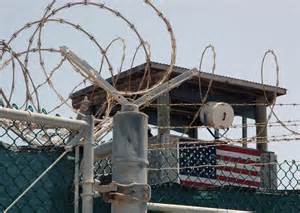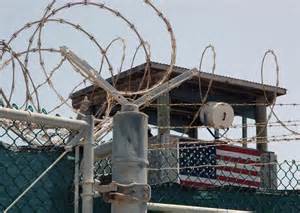
 It’s no secret that some serious and basic human rights are suspended, deferred, and outright denied for those caged at Guantánamo Bay, the United States’ military prison where it keeps its political prisoners. These violations also include the freedom to read.
It’s no secret that some serious and basic human rights are suspended, deferred, and outright denied for those caged at Guantánamo Bay, the United States’ military prison where it keeps its political prisoners. These violations also include the freedom to read.
Clive Stafford Smith, the director of the charity Reprieve, which provides legal assistance to the prisoners, has released a partial list (via the Guardian) of the books prison censors have barred him from giving his clients. As a disclaimer, two of Smith’s own books appear on the list.
An exploration of these titles in search of some rhyme, reason, or logic in the policy and its enforcement wielded many head-scratching moments of bewilderment. Despite diligent research on many of the titles, little to no precedent or reason could be found in the world outside of the prison’s walls for banning many of these:
- Martin Amis- Money
- Richard Beckett- The New Dinkum Aussie Dictionary
- Lord Thomas Bingham- The Rule of Law
- Russell Brand- Booky Wook Two
- Professor Alan Dershowitz- Blasphemy: How the Religious Right is Hijacking our Declaration of Independence
- Fyodor Dostoyevsky- Crime & Punishment
- Frederick Douglass- The African American Slave
- Frederick Forsyth- The Kill List
- George Galloway- I’m Not the Only One
- John Grisham- The Innocent Man
- John Kampfner- Blair’s Wars
- EM Naguib- Puss in Boots, Cinderella, Jack & the Beanstalk, Beauty and the Beast
- Wilfred Owen- Futility
- John Pilger- Hidden Agendas
- William Shakespeare- The Merchant of Venice
- Clare Short- An Honourable Deception: New Labour, Iraq and the Misuse of Power
- Aleksandr Solzhenitsyn- Gulag Archipelago
- Clive Stafford Smith- Bad Men, Injustice
- Harriet Beecher Stowe- Uncle Tom’s Cabin
- Scott Turow- Presumed Innocent
Some titles may- on the surface at least- seem to make sense as to why they’re on the list based on an ignorant and cursory glance at the titles without actually understanding the contents between their covers; but Puss in Boots, Cinderella, Jack & the Beanstalk, and Beauty and the Beast? Seriously? Do the administrators fear that prisoners may be wished away by fairy godmothers or escape via magic beans? Please- if anyone has any logical, sound reason as to why these books are offensive and dangerous for prisoners to have let me know. I couldn’t find a single reason.
The Dinkum Aussie Dictionary, by Richard Beckett, is one of Australia’s most popular slang dictionaries which uses humour to explore the culture and colloquialisms of the land Down Under. Designed to enlighten new arrivals and entertain native speakers with its observations, there is no valid reason why a little comedy isn’t permitted to break the desolation of prison life. Besides, breaking down language barriers might lead to- *GASP*– understanding and tolerance of differences!
Hmmm…now we’re at least getting somewhere-
Speaking of humour, Saudi national, Shaker Aamer, has been held for almost 12 years without charge after being captured in Kabul, Afghanistan, in 2001. He has indefinite leave to remain in the United Kingdom because he has a British wife and children who live in London.
Writing to the New Statesman, he says that his lawyer “amuses himself (and me) by testing what the censors will let through” as reading material. The latest violation includes Booky Wook 2, the second volume of comedian Russell Brand’s autobiography.
“I understand that Brand uses too many rude words,” he joked.
“I suppose you have to be amused by that: the US military is solicitous of my sensitive nature, and wants to protect me from swearing.”
In looking for valid reasons, at least Martin Amis is no stranger to controversy in regards to his writing- the advertising for his acclaimed autobiography, Experience, has been banned by London Underground because it features a photograph of the author smoking when he was underage.
Money: A Suicide Note, was released in 1984 and Time magazine lists the novel in its “100 best English-language novels from 1923 to the present”. It tells the story of, and is narrated by, John Self, a successful director of commercials who is invited to New York by a producer, Fielding Goodney, to shoot his first film. Self is an archetypal hedonist and slob- usually drunk, an avid consumer of pornography and prostitutes, eats too much and spends too much- all encouraged by Goodney.
It would seem that censors may be taking issue with the adult content of the novel.
The career highlights and accolades of the honourable Lord Thomas Bingham are many; he’s held every legal position possible and his groundbreaking book, The Rule of Law, embodies that lifetime of wisdom. ‘The Rule of Law’’ is a phrase often quoted but rarely understood. One of the world’s most acute legal minds examined what this idea actually means by making clear that the rule of law is not a sterile legal doctrine, but the foundation of a fair and just society and a guarantee of responsible government that offers the best means yet devised for securing peace and co-operation. He also examined the historical origins of the rule and discusses the strains imposed on the rule of law by the threat and experience of international terrorism.
Well, it’s fairly evident why this nugget of social and legal wisdom isn’t allowed to be read- we can’t have political prisoners becoming aware of what their rights are and what the responsibilities of their captors are in a “fair and just” system.
There are plenty of books on the list yet to discuss, and the search for reasons as to why stark political commentary such as the frequently-banned 1984 is allowed on the prison reading list, but Aleksandr Solzhenitsyn’s The Gulag Archipelago is not.
For more information on the Banned Books Awareness and Reading for Knowledge project and the complete list of titles covered, please visit the official website at http://bbark.deepforestproductions.com/
Sources: Time.com, Guardian, Metro (UK)
© 2013 R. Wolf Baldassarro/Deep Forest Productions

Leave a Reply